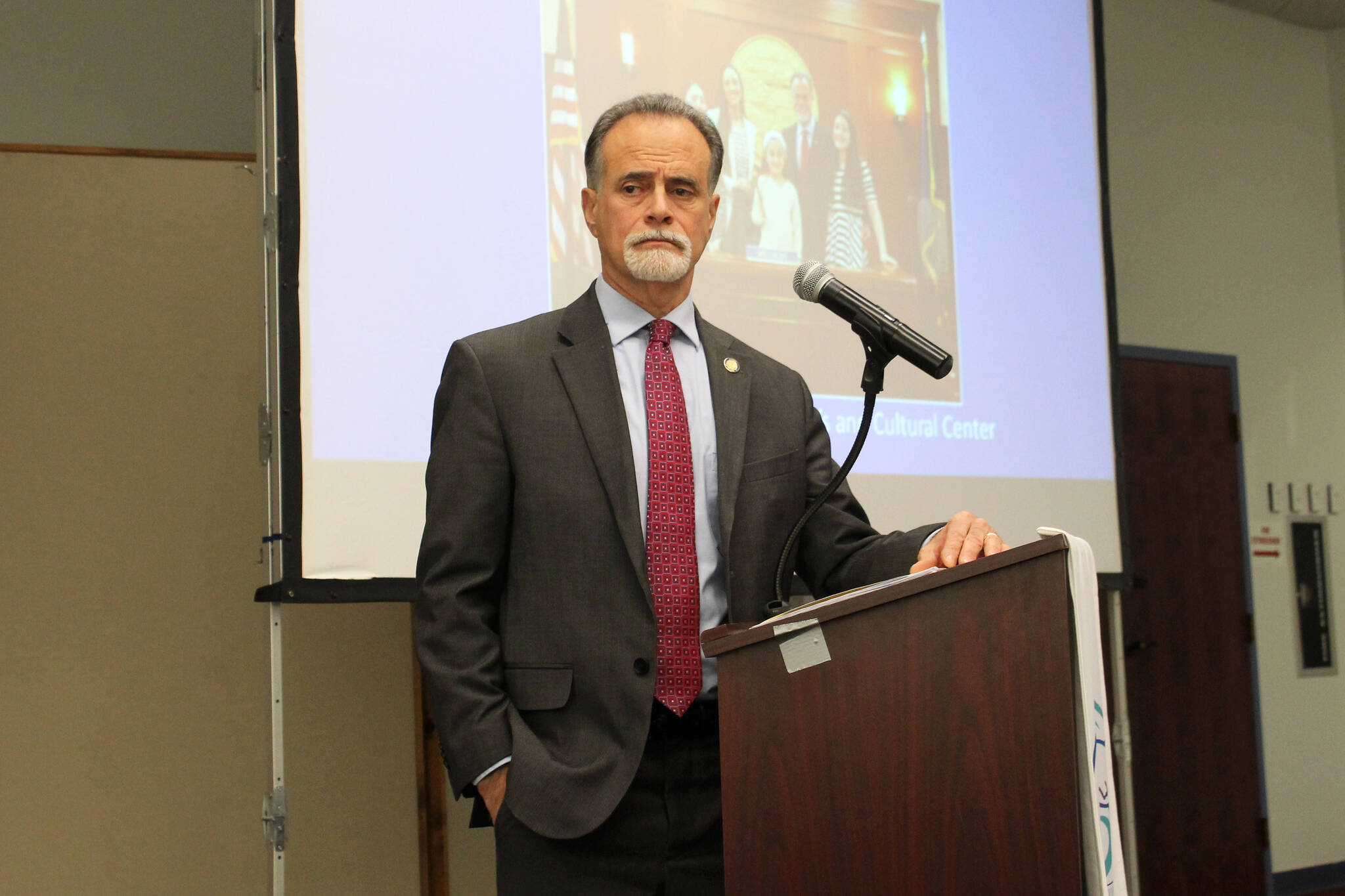KENAI —State Sen. Peter Micciche on Wednesday briefed a crowded room on what to expect during the Alaska Legislature’s upcoming session, set to kick off later this month.
During a joint meeting of the Kenai and Soldotna chambers of commerce at the Kenai Chamber of Commerce and Visitor Center, Micciche discussed bills he’s sponsoring, offered his perspective on Gov. Mike Dunleavy’s proposed fiscal year 2022 budget, highlighted legislation aimed at improving Alaska’s national education rankings and discussed options for solving the Alaska Permanent Fund dividend question.
“We’re hoping to deliver significant progress this session,” Micciche said.
Micciche said he wants to see two of his signature pieces of legislation make it across the finish line.
His S.B. 9 would modernize how Alaska regulates alcohol by overhauling the Title 4 of Alaska State Statute. Among other things, the bill — which has been roughly 10 years in the making — proposes the regulation of internet alcohol sales and more collaboration between the state’s Alcoholic Beverage Control Board.
Micciche’s S.B. 29 would establish a voluntary fishing permit buy-back program as a way to reduce tensions between eastern Cook Inlet’s commercial set-net fisherman and other fishing groups on the Kenai and Kasilof rivers. The program, which would be federally funded, has been touted as a way for set-net fishermen to “fairly exit” the fishery through a lottery-style system, with a goal of reducing the amount of fishing gear in the water.
Other bills Micciche said people should keep an eye on include S.B. 111, which he said is similar to the “Read by Nine” bill, and focuses on boosting educational outcomes in Alaska. He noted that Alaska ranks 51st in reading and 50th in math nationwide despite being in the top five of per-student spending.
“We have to dramatically improve the outcome and I think this bill does it,” Micciche said.
Performance Evaluation of Alaska’s Schools, or PEAKS, assessments are administered annually to Alaska’s third through ninth grade students to help track student performance. Statewide, 39.5% of students were considered advanced or proficient in English Language Arts and 32.38% were considered advanced or proficient in math. That is compared to the Kenai Peninsula Borough School District, where 48.55% of students were considered advanced or proficient in English Language Arts and 35.15% were considered advanced or proficient in math.
Micciche also expressed support for the $11 billion budget presented by Gov. Mike Dunleavy last month. The figure includes roughly $4.6 billion in federal funding, about $4.6 billion in unrestricted general funds, $912 million in designated general funds and $792 million in other state funds. The final package is subject to approval by the Alaska Legislature.
“I think he did a pretty good job,” Micciche said.
The budget proposed by Dunleavy includes $1.7 billion for a 2022 PFD payment of $2,564 for eligible Alaskans, which Dunleavy has said reflects his proposed 50-50 dividend plan, as well as $795.6 million to fund the remainder of the 2021 PFD using the same 50-50 plan.
The 50-50 plan would split permanent fund earnings equally between dividend payments and state services.
Micciche said Wednesday that he’s been clear that he supports a 50-50 plan for the PFD and said that the longer the PFD remains an issue to be solved, the less time the state has to address the state’s other problems.
“Continued ad hoc budgeting will deliver the same ineffective result, additional years of fighting over the PFD, more single-issue candidates and an Alaska economy that remains stymied due to instability and uncertainty,” Micciche said.
More generally, Micciche emphasized the role of individual Alaskans in helping guide the trajectory of the state’s economy and encouraged people to be active in voicing their vision of the future.
“We need to hear from you,” Micciche said. “What’s your vision for the state? Do you want to keep fumbling around with no cranes on the skyline?”
Among the peninsula-specific items included in the proposed capital budget are $6.5 million for stabilizing the Kenai bluff, which would complete the City of Kenai’s local financial match for the project at current estimates. That’s in addition to a proposed $94 million for Seward Marine Center Research Vessel infrastructure and $4.3 million for Big Eddy EVOS Restoration improvements.
Dunleavy has already announced some of his priorities heading into the upcoming session, such as an omnibus public safety bill that would target domestic violence and sexual assault as well as missing and murdered Indigenous persons and homelessness, as well as an election integrity bill he hopes to pass ahead of a busy election season.
The upcoming legislative session begins on Jan. 18. More information about the Alaska Legislature, including bills and lawmakers, can be found at akleg.com.
• Reach reporter Ashlyn O’Hara at ashlyn.ohara@peninsulaclarion.com.

